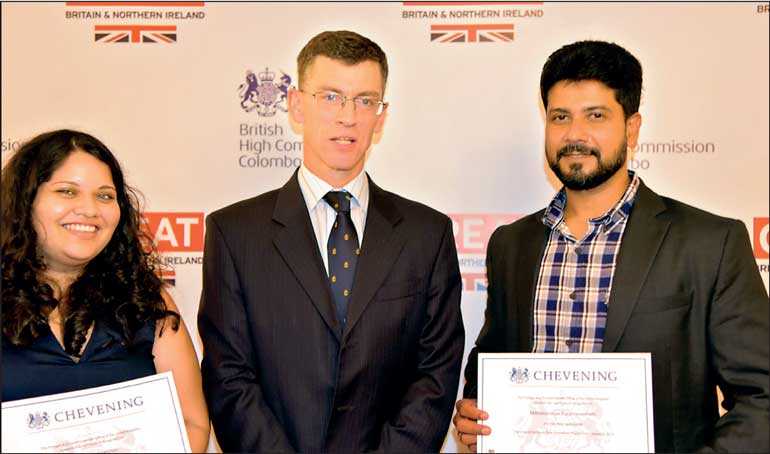Friday Feb 20, 2026
Friday Feb 20, 2026
Friday, 1 March 2019 00:00 - - {{hitsCtrl.values.hits}}

Mathanavasan Paramanantham and Raisa Wickrematunge will be the latest Sri Lankan participants on the British Government’s Chevening South Asia Journalism Fellowship scheme. The fellows will be leaving for the UK in March to undertake a programme at the University of Westminster in London.
Titled ‘Good Governance in a Changing World: the Media, Politics and Society’, the programme will bring together experienced journalists from around South Asia. The programme explores the important role the media has in holding governments, public services, other organisations and individuals to account, and the different ways in which journalists can do this.
The Fellowship has been open to participants from Sri Lanka since 2017, and this is the third group of fellows travelling to the UK.
Press freedom and journalists’ safety is a global priority for the British Government. In July this year the UK will host an international conference in London on media freedom. For two days it will bring together foreign ministers, industry figures, representatives of civil society, academics and the wider media to push for a greater appreciation of the value of having an independent media, and to encourage a more co-ordinated approach to securing the safety of media professionals.
Speaking at a reception organised to celebrate the new Fellows’ success, the British High Commissioner to Sri Lanka James Dauris said, “Good journalism helps to safeguard all of the freedoms that we cherish; it protects public interests; it helps to keep democracies democratic, and elections free and fair; it is a vital bulwark against corruption and organised crime.”
Below are excerpts from his speech:
“The most recent Freedom House index shows democracy in retreat in more countries around the world than it has been advancing in. A growing number of governments are increasingly using restrictive laws to stifle freedom of expression and prevent the functioning of an independent media. For commercial, criminal, political and many other reasons people seek to prevent journalists looking into those dark corners where we need light to shine. The pages of Sri Lanka’s recent history carry stories of terrible violence against writers, cartoonists, editors, crimes for which the people responsible have still not been held to account.
“The growing digital space is an increasingly important tool for journalists to research and build their stories, and to reach more people than ever before. Journalism informed and driven by data has produced some of the most important stories of recent years. One of our Journalism Fellows this year runs a media platform that is exclusively online, while the other is an editor of a Daily Newspaper that has its foundations in the online space.
“The UK believes that protections for journalists – formal or informal, bloggers for example – need to extend to those operating in the digital space. A threat against a journalist made online is no less serious than one made in person or through the post.
“We need good, honest investigative journalists. Every society needs them, those where they aren’t allowed to operate almost certainly most of all. It comes as no surprise that there’s a direct correlation between countries with the greatest media freedom and the lowest levels of corruption.
“We are proud that the UK has long supported media freedoms globally, and is home to a wealth of media expertise and innovation. We are committed to this cause at home, and through partnerships with our friends across the world. For example, our Magna Carta Fund for Human Rights and Democracy supports crucial frontline work training journalists, including on personal and online safety skills. All this will remain a priority for us.”